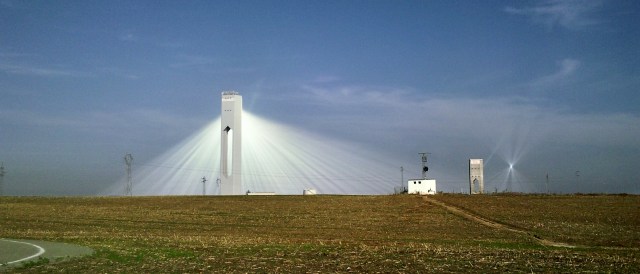In the last decade, governments, the European Commission and numerous research institutes have produced one scenario for the electricity system after the other. These scenarios inform us of the future electricity mix and, importantly, of its costs, as a base for national and European energy policies. Johan Lilliestam argues that cost can not be the only determinant of our future electricity system – first, we have to politically determine what kind of energy future we want to live in.

It’s not about the cost but the world we want to live in. (Photo by Velvet, CC BY-SA 3.0)
Against the backdrop of such scenarios, actors from policy, industry, civil society and science start debating, commonly using “scientific” arguments: the costs of nuclear power were assumed too high or too low, the costs to include variable wind power in the system have been under- or overestimated, carbon capture and storage was assumed too expensive, and so on.
But is it really about cost? Isn’t, for example, the nuclear issue about whether we want it or not, rather than its costs per kilowatt in 2030? Of course it is.
From the nuclear debate in the last decades, we know that the worldview is important for the energy options we support. Nuclear supporters emphasise the (in their view low) cost, whereas opponents strictly reject this technology, mainly based on waste, accident and proliferation risks. In a sense, cost arguments stand against the safety of our children.
Renewables, although a largely clean and safe group of technologies, hold different but equally deep ideological differences.
Supergrids or decentralised electricity?
The dominant policy outlook for renewables is a Europe-wide, densely meshed supergrid with large amounts of renewable electricity flowing across the continent to balance the fluctuating nature of wind and solar power. Such supergrid scenarios are the outcome of neat cost-optimisation models and resonate well with economists and European or national politicians. Low-cost climate protection is the aim of such visions.
Another vision for renewables foresees the creation of autarkic regions that supply themselves with electricity, using the resources available locally without trade between regions. In such decentralised energy futures, which resonate with local politicians and citizens’ movements, local value creation and independence (from imports and major energy companies) are the main aims, and renewables are a suitable tool to achieve them. Costs, however, are hardly a parameter in this outlook.
Values and worldviews matter more than cost
Except for the word “renewables”, decentralised renewables visions have little in common with renewable supergrid scenarios. They represent completely different worldviews and have very different aims. Such qualitative political and ideological differences are not immediately visible in scenarios, and they are hardly present in the scientific energy scenario debate.
Missing this point can be fatal: A few years back, I was staged in a podium discussion against Hermann Scheer, the guru of decentralised energy in Germany. I thought I was very clever when I presented some rough calculations about why his decentralised idea was way too expensive to be realistic. His reply to my numbers: “freedom has no price”. It goes without saying that I lost the debate.
Europe stands before an important electricity choice: will we stay with the nuclear-fossil power system, or take a renewable path, and if so – which one? In its core, a useful energy debate is not about which cost assumptions are “correct” or whether a particular scenario is “realistic” (as this – sic! – depends on the perspective), but about values and worldviews. The choice is about the future we want, and not what it costs to get it.
This article was written by Johan Lilliestam, who is researcher at the Chair of Human-Environment Systems at ETH Zurich. It first appeared on ETH Zurich Zukunftsblog.
[…] 2014/03/10: GET: 50 shades of green: what determines our electricity future? […]